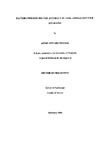FACTORS INFLUENCING THE ACCURACY OF TASK COMPLETION TIME ESTIMATES
| dc.contributor.author | THOMAS, KEVIN EDWARD | |
| dc.contributor.other | School of Psychology | en_US |
| dc.date.accessioned | 2013-09-24T09:32:22Z | |
| dc.date.available | 2013-09-24T09:32:22Z | |
| dc.date.issued | 2004 | |
| dc.identifier | NOT AVAILABLE | en_US |
| dc.identifier.uri | http://hdl.handle.net/10026.1/1910 | |
| dc.description.abstract |
Whilst considerable research has found that people tend to underestimate their task completion times (e.g., Buehler et al., 1994), factors that might influence the accuracy of temporal predictions have received little empirical treatment. The research presented in this thesis identified two distinct factors that mediated time estimation accuracy and bias. One factor was task duration, whereas the other factor was the person’s prior experience of the task. There was evidence that having prior experience of performing all or a substantial part of the same task enabled participants to more accurately estimate its duration. Additionally, predictions were more accurate when participants viewed tasks before making time estimates. Contrary to the theory of the planning fallacy (Kahneman & Tversky, 1979), these findings suggest that people do take account of their previous task performance, and use such distributional information to good effect. However, there was evidence of time prediction bias when unrelated tasks were completed beforehand, suggesting that erroneous information about previous task performance was used when making a subsequent estimate. The directional nature of time estimation bias was also highlighted in the present research. In general, there was some evidence of temporal overestimation on tasks with a duration of up to four or five minutes, whereas participants tended to underestimate their completion times on tasks that took between eight and 16 minutes to complete. These findings indicate that task duration influences the direction in which time estimates are biased (i.e., under or overestimation), with the temporal underestimation indicative of the planning fallacy occurring on tasks of at least eight minutes' duration. The present research has potential implications for task duration estimation in everyday life, and outlines conditions under which prediction bias can be reduced. The present findings are discussed in relation to the theory of the planning fallacy and the potential role of cognitive judgemental heuristics in determining temporal misestimation. | en_US |
| dc.language.iso | en | en_US |
| dc.publisher | University of Plymouth | en_US |
| dc.title | FACTORS INFLUENCING THE ACCURACY OF TASK COMPLETION TIME ESTIMATES | en_US |
| dc.type | Thesis | |
| plymouth.version | Full version | en_US |
| dc.identifier.doi | http://dx.doi.org/10.24382/4668 | |
| dc.identifier.doi | http://dx.doi.org/10.24382/4668 |
Files in this item
This item appears in the following Collection(s)
-
01 Research Theses Main Collection
Research Theses Main


